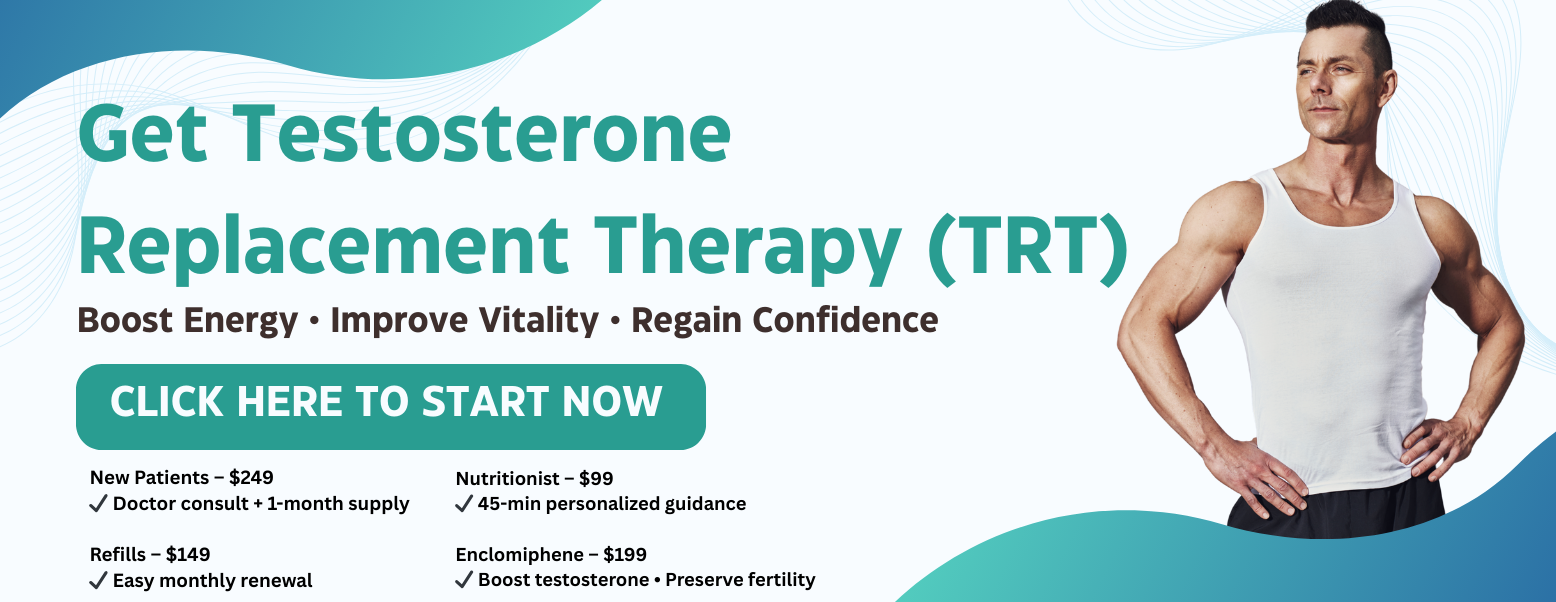Testosterone replacement therapy (TRT) is no longer simply a "fix" to address fatigue or low libido—it has become a lifestyle change for many men in the year 2025.
Do you find yourself feeling less like yourself lately? Motivational decline, dips in energy, shifts in mood may not just be from aging but may also be a reflection of low testosterone.
With better awareness around men's hormonal health, long-term testosterone replacement therapy (TRT) is becoming a real pathway to feeling better through improved energy, looking sharper through body composition changes, and living stronger through better overall health and vitality. But what happens if you are on TRT for years and not just months? This is where TRT is now more than simply taking testosterone as a drug.
Don’t Wait, Reclaim Your Vitality – Click here to Book Your TRT Consultation Now!
In this article, we will discuss the potential long-term effects, both positive and negative, to help you make informed choices based on science and the medical experience of our clinics.
Prevalence of Low Testosterone in Men
- About 40% of men over the age of 45 have low testosterone.
- By age 70, the prevalence may approach 60% with potential signs of clinical fatigue, low libido, and/or mood changes.
- Although there are 4 to 5 million men in the U.S. with testosterone deficiency, only a small percentage are appropriately assessed and treated.
TRT Growth Statistics (2025 Outlook)
- The global Testosterone Replacement Therapy market is predicted to reach $3.2 billion by 2025, representing a CAGR of 4.5%.
- In the last ten years, TRT prescriptions have increased more than 150% in the U.S.
- Today, telehealth services represent 30% of new TRT starts, providing convenience, accessibility, and men-only clinicians in the privacy of their homes.
The Long-Term Benefits of TRT
Sustained Energy and Vitality
Men on TRT regularly attest to experiencing an “on-off switch" in energy that just remains in the "on" position, day in and day out! Testosterone is responsible for red blood cell development to help transport oxygen. When a man has all the testosterone he needs, he feels sufficient throughout his entire body over time.
Improved Mood and Mental Health
Long-term users of testosterone replacement therapy frequently state they have a much less emotional rollercoaster, less stress, and more resiliency from outside stressors. Their dopamine and serotonin feel regulated, which helps manage mood and health.
Increased Muscle Mass and Strength
With correct training and frequent testosterone replacement therapy, men are able to maintain a better amount of lean mass, strength, and endurance in their 60s and 70s. This leads to greater mobility, independence, and metabolic health, which are all markers of great quality of life.
Reduced Fat Mass and Improved Body Composition
Testosterone therapy helps place fat and muscle ratios back to their proper place in men. Specifically, testosterone replacement therapy helps men shed belly fat and promotes insulin sensitivity that was lost through aging. Over time, reduced body fat and improved body composition help decrease the chance of pre-diabetes and the man adopts a healthier, more athletic, body.
Improved Sexual Function and Libido
A consistent testosterone level means consistent desire, performance, and satisfaction. Long-term testosterone replacement therapy (TRT) is instrumental in maintaining blood flow, hormone levels and, ultimately, sexual wellness and health.
Cognitive Support and Brain Health
Recent studies have demonstrated a disease-preventing possibility with long-term TRT, as it has been associated with improvements in executive function, memory and a decrease in "brain fog". Therefore, TRT may actually play an important role in preventing workplace and later-life cognitive decline.
Bone Density and Fracture Prevention
Many men on TRT over extended periods report increased bone mineral density. The act of doing so is critical to male fracture and maintaining activity. Long-term testosterone replacement therapy helps minimize the chances of developing osteoporosis.
Long-Term Risks of TRT in 2025
Polycythemia (Elevated Red Blood Cell Count)
TRT increases red blood cell production. If you do not monitor your total red blood cells, your blood can thicken causing an increased risk of clotting. This can be diagnosed with a routine blood test; you can regularly give blood as a basic treatment.
Cardiovascular Risk Debate
In the early years of TRT, many cardiovascular risks were speculated; however, new studies have shown as long as a therapist is properly monitored and/or guided, cardiovascular outcomes were neutral or positive in men receiving TRT. The individual cardiovascular risk profile is still relevant, hence the need for individualized plans.
Prostate Health Concerns
Prostate Health Risks Studies have shown that TRT does not cause prostate cancer; however, it increases the rate of growth for existing conditions. PSA testing, digital rectal exam (DRE) and other interventions are not negotiable, particularly for the cohort population over the age of 40.
Infertility and Testicular Shrinkage
If you are on TRT for longer periods of time, you will have reduced sperm production; in addition, the testicles will shrink, or will have a reduced capacity for size, as a consequence of feedback suppression of production of all hormones in your body from the HPA & HPG feedback loops. In many cases, fertility may be preserved through the co- administration of TRT with HCG therapy.
Mood Instability if Mismanaged
Skipping doses, overuse, or improper doses can create fluctuations in hormone levels and lead to anxiety, low moods, and aggression; consistency and adjustment by an expert will hopefully create the treating of anxiety, low moods, and aggression when they relate to hormones.
Financial Commitment
Long-term TRT is not a one-and-done event; it is an ongoing commitment. Thankfully, subscription service type models (such as The KIF) combine meds, labs and consults, making ongoing therapy more affordable and convenient.
Who Should and Shouldn’t Consider Long-Term TRT?
Ideal Candidates:
- Men diagnosed with low testosterone through blood work
- Men who are experiencing chronic fatigue, depression or low libido
- Men who are prepared for a long-term commitment to medication
Not Ideal for:
- Men seeking immediate improvements for athletic or cosmetic purposes
- Men with severe obstructive sleep apnea or prostate cancer who have not received treatment
- People who shy away from medical monitoring or medical testing
How to Ensure Safety and Success with Long-Term TRT
- Regular Lab Testing
Every 3–6 months, test levels of testosterone, estradiol, hematocrit, PSA, liver function, and much more so that issue can be identified early.
- Work with a Specialist
Providers who treat TRT as a specialty (not as a side service) will help you on your journey. The physician-led care model of KIF care provides standardized dosing that will change over time.
- Maintain a Healthy Lifestyle
Testosterone Replacement Therapy is most effective when co-administered with:
- Strength training
- A whole food-based micronutrient diet
- Adequate Sleep
- Stress management Free
These approaches amplify effects and minimize side effects.
- Report Side Effects Immediately
Any slight changes in libido or emergence of irritability are indications of hormonal imbalance. Reporting side effects early means that we can act timely.
How to Choose TRT Therapy: A Step-by-Step Guide for Men in 2025
Start with Proper Diagnostic Testing
Your provider should be testing:
- Free and total testosterone
- Estradiol and SHBG
- PSA, CBC, and metabolic panels
- Liver and kidney status
Choose an Experienced Provider
What to Look For:
- Will tailor a dosing plan
- Will monitor BOTH estradiol and testosterone
- Will provide ongoing consults as needed, not just a prescription
- Steer clear of clinics that don't require lab work or that use a "generic" one-size-fits-all approach.
Understand the Different Delivery Methods
Common TRT Methods:
- Injections (IM/Sub-Q): Most precise and popular
- Topical Gels/Creams: Easy, though absorption can vary
- Pellets: Sustained but invasive
- Oral Tablets/Buccal Forms: Convenient, but few long term studies
Injections remain the most preferred due to the ability to develop an accurate and precise dosing regimen; that said, The KIF offers reasonable inexpensive monthly kits of all the testosterone delivery options as mentioned here.
Evaluate the Monitoring Plan
What’s Ideal:
- Monitor hormonal symptoms and trends
- Adjust dosage accordingly
- Have regular follow-ups
Best Practice:
- Provide initial consults every 4-6 weeks
- Lab work every 3-6 months
- Real living Doctors adjusting the dosage for you, NOT a script from a computer.
What The KIF Offers:
- A monthly supply of testosterone
- A monthly teleconsult
- Lab testing and adjustments continue to be individualized based on your body.
Review Pricing and Value
Typical Monthly Cost Comparison
| Provider Type | Average Cost | Includes Consults & Meds? |
| Concierge Clinic | $300–$600 | Sometimes |
| Local Urologist | $150–$400 | Rarely includes meds |
| The KIF Subscription | $149–$249 | Yes |
-
Check for Safety Protocols and Medical Oversight
Don’t compromise on safety. Your TRT provider should offer:
- Hematocrit surveillance
- Estrogen modulation (ie. aromatase inhibiting) clarity plans
- PSA monitoring for prostate safety
- Clean, regulated testosterone products- not unvalidated supplements
Conclusion
Testosterone Replacement Therapy, with precise monitoring, can upgrade your long-term health. TRT improves so many aspects of the male physical human experience - energy, mood, strength, sex , cognition, enduring the aging process - albeit with a clear conscience. The testosterone replacement process must be illusive and one that must be done, done well.
The KIF provides smart professional care that comes with routine monitoring. It is online, convenient and your monthly investment works easily on your budget, so you just focus on thriving rather than simply surviving.
Patient Consult - $0
No obligation - just expert professional advice.
TRT for new Patients - $249
Complete hormone panel, consultation, and initial dosage for the month:
Monthly TRT Subscription Plan
Includes medication, outcome review, expert advice, simple and easy
Refill Packages - $149/month
Confident care, no guesswork.
Start your TRT experience with clarity, and optimism.
FAQs
1. Is it safe to stay on TRT for life?
Yes - many men have utilized TRT for decades without major complications with ongoing labs and medical supervision.
2. Can long-term TRT help prevent age-related decline?
Absolutely. It allows you to think sharper, maintain your muscle mass longer, and enhance your energy in healthy aging!
3. Will I lose fertility forever on long-term TRT?
Not usually. The majority of men using TRT will preserve or regain their fertility with HCG therapy. Make sure to clarify this with your provider before you start.
4. Can I stop TRT once I start?
Yes - though symptoms may return, if you do stop, work with your doctor to do a safe taper.
5. Does long-term TRT increase the risk of cancer?
There is no direct link between TRT causing cancer. That being said, make sure to get periodic prostate checks to help mitigate your risk.
 Since 2021, Kif offers a streamlined platform to get a medical marijuana card online. We have served more than 45K patients across the United States. Sign Up Now to get the right to use medical cannabis for your health condition without any delay.
Since 2021, Kif offers a streamlined platform to get a medical marijuana card online. We have served more than 45K patients across the United States. Sign Up Now to get the right to use medical cannabis for your health condition without any delay.
























